

Pro-feminism. Pro-feminism refers to support of the cause of feminism without implying that the supporter is a member of the feminist movement.
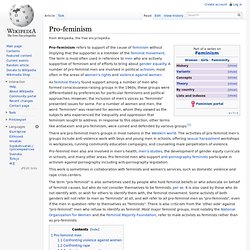
The term is most often used in reference to men who are actively supportive of feminism and of efforts to bring about gender equality. A number of pro-feminist men are involved in political activism, most often in the areas of women's rights and violence against women. As feminist theory found support among a number of men who formed consciousness-raising groups in the 1960s, these groups were differentiated by preferences for particular feminisms and political approaches. However, the inclusion of men's voices as "feminists" presented issues for some. For a number of women and men, the word "feminism" was reserved for women, whom they viewed as the subjects who experienced the inequality and oppression that feminism sought to address.
There are pro-feminist men's groups in most nations in the Western world. Men and feminism. Since the 19th century, men have taken part in significant cultural and political responses to feminism within each "wave" of the movement.
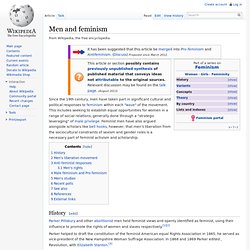
This includes seeking to establish equal opportunities for women in a range of social relations, generally done through a “strategic leveraging” of male privilege. Feminist men have also argued alongside scholars like bell hooks, however, that men’s liberation from the sociocultural constraints of sexism and gender roles is a necessary part of feminist activism and scholarship.
Masculism. Antifeminism. Antifeminism is opposition to feminism in some or all of its forms.
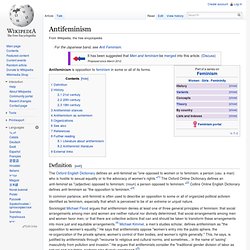
Definition[edit] The Oxford English Dictionary defines an anti-feminist as "one opposed to women or to feminism; a person (usu. a man) who is hostile to sexual equality or to the advocacy of women's rights. "[1] The Oxford Online Dictionary defines an anti-feminist as "(adjective) opposed to feminism; (noun) a person opposed to feminism. War on Women. The phrase and the concept have been criticized by Republicans and some pro-life Democrats.[21] Republican National Committee chairman Reince Priebus described it as an over-simplified fiction advanced by Democrats and the media[22][23] while other Republicans contended that such rhetoric was used as a distraction from President Barack Obama and the Democrats' handling of the economy.[24][25][26] In August 2012, Todd Akin's controversial comments regarding pregnancy and rape sparked renewed media focus on the concept.[27][28][29] Republicans have tried to turn the phrase against Democrats by using it to argue hypocrisy for not critiquing sex scandals of members within their Party, who have cheated, sexted, and harassed women; and for not supporting bills to combat sex-selective abortion.[30][31][32][33] Development of the term[edit] George W.
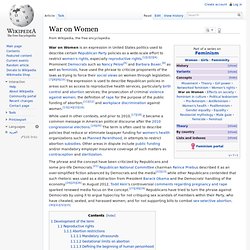
Reproductive rights[edit] Zerlina Maxwell, in an editorial for U.S. Abortion restrictions[edit] Rape and pregnancy controversies in United States elections, 2012. Following Akin's comments, additional controversies arose around other remarks made by various Republican politicians.
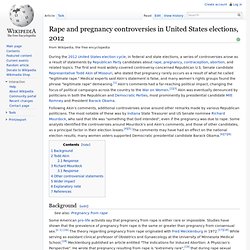
The most notable of these was by Indiana State Treasurer and US Senate nominee Richard Mourdock, who said that life was "something that God intended", even if the pregnancy was due to rape. Some analysts identified the controversies around Mourdock's and Akin's comments, and those of other candidates, as a principal factor in their election losses.[4][5] The comments may have had an effect on the national election results; many women voters supported Democratic presidential candidate Barack Obama.[6][7][8] Background[edit] Some American pro-life activists say that pregnancy from rape is either rare or impossible. Studies have shown that the prevalence of pregnancy from rape is the same or greater than pregnancy from consensual sex. Several pro-life politicians have made similar statements. Feminazi. Feminazi is a term popularized by radio talk-show host Rush Limbaugh and in use since the early 1990s.
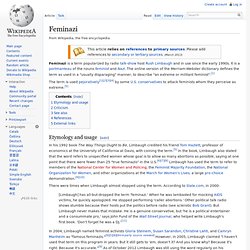
It is a portmanteau of the nouns feminist and Nazi. The online version of the Merriam-Webster dictionary defines the term as used in a "usually disparaging" manner, to describe "an extreme or militant feminist".[1] The term is used pejoratively[1][2][3][4] by some U.S. conservatives to attack feminists whom they perceive as extreme.[5] Radical feminism. Marxist feminism. Marxist feminism is a sub-type of feminist theory which focuses on the social institutions of private property and capitalism to explain and criticize gender inequality and oppression.
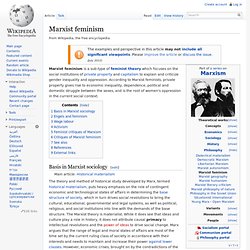
According to Marxist feminists, private property gives rise to economic inequality, dependence, political and domestic struggle between the sexes, and is the root of women's oppression in the current social context. Basis in Marxist sociology[edit] The theory and method of historical study developed by Marx, termed historical materialism, puts heavy emphasis on the role of contingent economic and technological states of affairs in determining the base structure of society, which in turn drives social revolutions to bring the cultural, educational, governmental and legal systems, as well as political, religious, and social institutions into line with the demands of the base structure.
Socialist feminism. Socialist feminism is a branch of feminism that focuses upon both the public and private spheres of a woman's life and argues that liberation can only be achieved by working to end both the economic and cultural sources of women's oppression.[1] Socialist feminism is a two-pronged theory that broadens Marxist feminism's argument for the role of capitalism in the oppression of women and radical feminism's theory of the role of gender and the patriarchy.
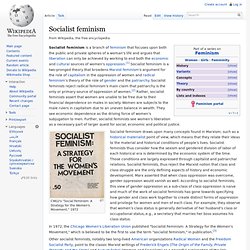
Socialist feminists reject radical feminism’s main claim that patriarchy is the only or primary source of oppression of women.[2] Rather, socialist feminists assert that women are unable to be free due to their financial dependence on males in society. Women are subjects to the male rulers in capitalism due to an uneven balance in wealth. Anarcha-feminism. A purple and black flag is often used to represent Anarcha-feminism.
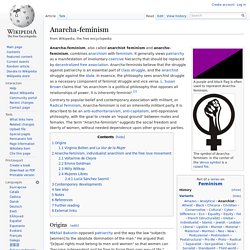
Contrary to popular belief and contemporary association with militant, or Radical Feminism, Anarcha-feminism is not an inherently militant party. It is described to be an anti-authoritarianism, anti-capitalism, anti-oppressive philosophy, with the goal to create an "equal ground" between males and females. Postcolonial feminism. Postcolonial feminism is a subset of feminism that developed as a response to the fact that feminism seemed to focus solely on the experiences of women in Western cultures.
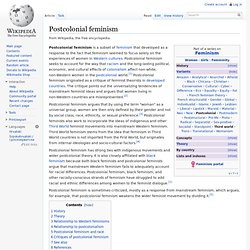
Postcolonial feminism seeks to account for the way that racism and the long-lasting political, economic, and cultural effects of colonialism affect non-white, non-Western women in the postcolonial world.[1] Postcolonial feminism originated as a critique of feminist theorists in developed countries. The critique points out the universalizing tendencies of mainstream feminist ideas and argues that women living in non-Western countries are misrepresented.[2] Postcolonial feminism argues that by using the term "woman" as a universal group, women are then only defined by their gender and not by social class, race, ethnicity, or sexual preference.[3] Postcolonial feminists also work to incorporate the ideas of indigenous and other Third World feminist movements into mainstream Western feminism. Consciousness raising. Etymology[edit] The term awareness raising is used in the Yogyakarta Principles against discriminatory attitudes[1] and LGBT stereotypes, as well as the Convention on the Rights of Persons with Disabilities to combat stereotypes, prejudices, and harmful practices toward people with disabilities.[2] Until the early 17th century, consciousness was used in the sense of moral knowledge of right or wrong, which today is referred to as conscience. [3]
Misogyny and mass media. Examples of misogyny exist in many published forms, within multiple cultures and well observed works.[1][2] Technological advances in the modern era have contributed proficient means to media and marketing to the resultant mass media in the 21st century. The merging of Misogyny and mass media has made numerous examples where studies have concluded correlations between misogynous messages, both obvious and subliminal. Corresponding physical appearance of violence and hateful conduct may be seen relative to exposure.[3] Music, violence, and aggression[edit] Messages containing misogynous views are found commonly in the media.[4] Music has become incorporated into our society, permeating many parts of our lives.[5] Music can be found in almost all types of media, especially television, movies and advertising. Gangsta rap[edit] Eminem performing live at the DJ Hero Party in Los Angeles.
Sex differences in religion. Sex differences in religion can be classified as either "internal" or "external". Internal religious issues are studied from the perspective of a given religion, and might include religious beliefs and practices about the roles and rights of men and women in government, education and worship; beliefs about the sex or gender of deities and religious figures; and beliefs about the origin and meaning of human gender.
External religious issues can be broadly defined as an examination of a given religion from an outsider's perspective, including possible clashes between religious leaders and laity;[1] and the influence of, and differences between, religious perspectives on social issues. For example, various religious perspectives have either endorsed or condemned alternative family structures, homosexual relationships, and abortion.[2] External religious issues can also be examined from the "lens of gender" perspective embraced by some in feminism and/or critical theory and its offshoots. Let’s All Write Open Letters To Miley Cyrus And Also Your Mom Forever And Ever. It’s begun. With Sinead O’Connor’s open letter to Miley Cyrus, and Amanda Palmer’s open letter to Sinead O’Connor, a chain of events has been put into motion which no force in heaven or earth can stop until it’s run its course and we are left with the smoking, burnt-out ruins of a culture.
Caitlin Moran has already started her open letter to Amanda Palmer about how everything a woman does is okay, because she’s a woman and that’s what feminism means. An open letter to sinéad o’connor, re: miley cyrus. The official website of Amanda Fucking Palmer. Genetic determinism. Origins[edit] Genetic determinism, which identifies the gene as the biological source of morphology and instinct, can be traced back to Austrian theorist August Weismann, who proposed in the 1890s that the key actors in the struggle for survival are not organisms but their genes, which he called determinants. While Darwin’s concept of natural selection was intended to apply to whole organisms, Weismann modified Darwin's idea according to a process he called "germinal selection.
"